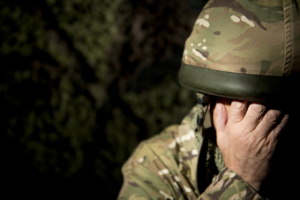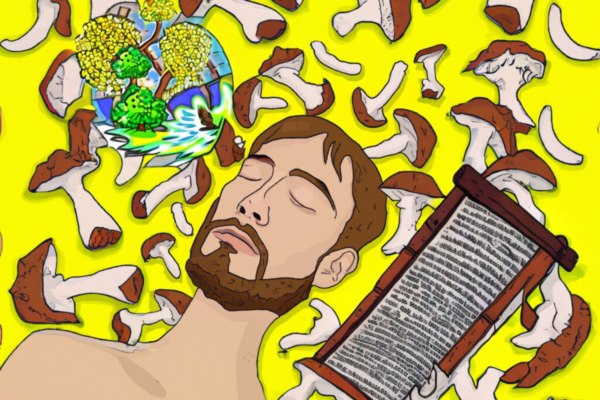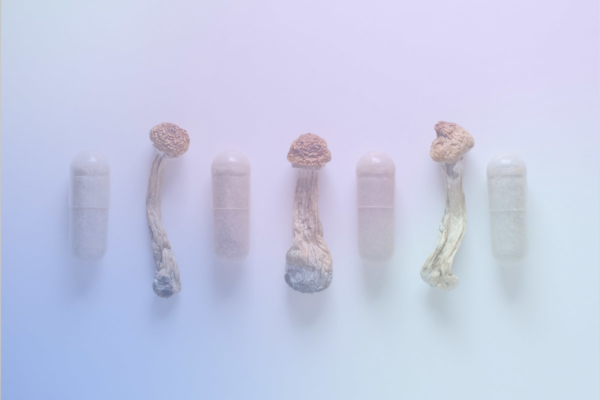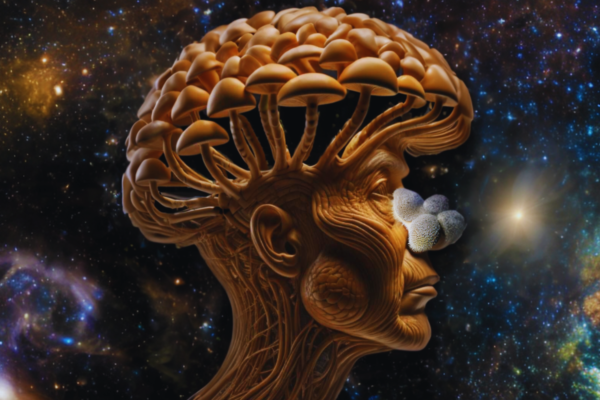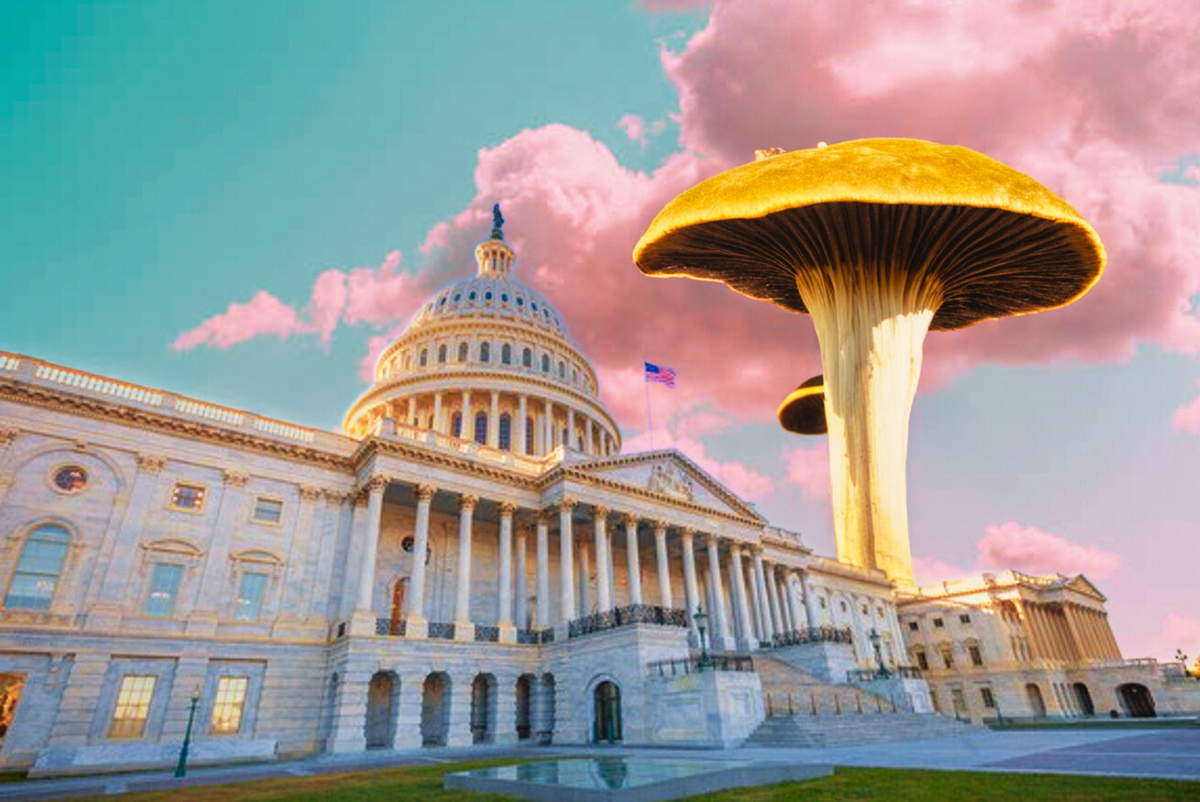
New research opens up the possibility of treating OCD with psychedelics, and another study shows a sharp reduction in substance use following psychedelic consumption.
There have been promising developments in stories we’ve previously covered, as Nevada Governor Joe Lombardo passed bill SB242 and Rhode Island’s House of Representatives approved bill H5923. A press briefing for The Douglas ‘Mike’ Day Act revealed how ibogaine therapy has helped veteran lawmakers overcome their trauma.
The Psychedelic Science Conference expects record attendance in its fourth edition, promising exciting conferences, workshops, and ancillary events.
Rhode Island House of Representatives approves bill to legalize psilocybin
The Rhode Island House of Representatives has approved bill H5923 in a 54-11 vote, sending it to the Senate for consideration. This bill proposes the legalization of the possession and cultivation of magic mushrooms and lays the groundwork for regulated therapeutic access to psilocybin if the Food and Drug Administration reschedules this substance.
If passed, the legislation would remove criminal penalties for possession and cultivation of up to one ounce of psilocybin for personal use. Beginning July 1, people who are 18 and over would also be able to share that amount with other adults.
As of today, psilocybin is wrongly classified as a Schedule 1 substance, a classification given to substances with a lack of medicinal uses and a high potential for abuse. There’s hope that this rescheduling could happen soon since the FDA has designated mushrooms as breakthrough therapy on numerous occasions.
The bill has also received a hearing in the Rhode Island Senate’s legislative committee, but its members have decided to hold it for further study before it’s voted.
Nevada governor signs bill to create state’s first psychedelics working group
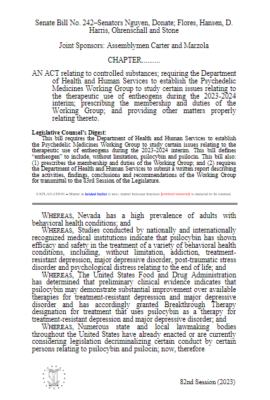
Governor Joe Lombardo gave bill SB242 final approval last Tuesday after some uncertainty about whether he would pass the legislation or not. Effective immediately, the state will create Nevada’s first psychedelic working group under its Department of Health and Human Services.
This 15-member working group will have to study how psilocybin and psilocin improve overall wellness, help treat mental disorders, and support patients through end-of-life care.
It also has to “develop a strategic, measurable and actionable plan to allow access to safe and affordable entheogens so that such entheogens may be used for therapeutic purposes.”, and report its findings to the legislature by December 31, 2024.
While it’s far from legalizing psychedelics, the bipartisan support this bill received demonstrates how the public’s opinion on these substances has shifted drastically, and if this working group is successful, it could lead to legalization down the line.
GOP Congressman pushes for ibogaine psychedelic therapy
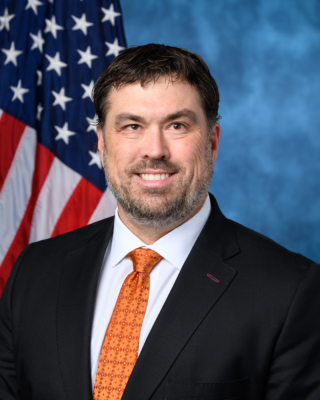
Earlier this week, G.O.P lawmakers and military veterans briefed the press on the Douglas ‘Mike’ Day Psychedelic Therapy to Save Lives Act of 2023.
One of the most surprising testimonies came from Rep. Morgan Luttrell, a Republican congressman and military veteran who had trouble adapting to civilian life after leaving the Navy due to problems with aggression. He claimed that psychedelic therapy with ibogaine and 5-MeO-DMT changed his life.
“I was reborn. It saved my marriage,” he said. “It is one of the greatest things to ever happen to me.”
The bill, named in honor of a former Navy SEAL and Silver Star recipient who died in March 2023, would create a $75 million federal grant program to support Phase 2 clinical trials exploring the effectiveness of psychedelics in treating PTSD, brain injuries, and chronic traumatic encephalopathies. It would also fund training programs for practitioners on the provision of these treatments.
If it were approved, it would distribute $15 million each year from fiscal years 2024 to 2028 to federal and state agencies, academic institutions, and non-profit organizations dedicated to psychedelics research.
It also states that the clinical trials funded by the grants could take place regardless of whether the substance is controlled under federal or military statutes.
The defense secretary would have to report to Congress every 180 days, providing information about the clinics that received the grants, the number of service members who participated in the clinical trials, and their results.
New study suggests psychedelic psychotherapy may be useful for treating OCD
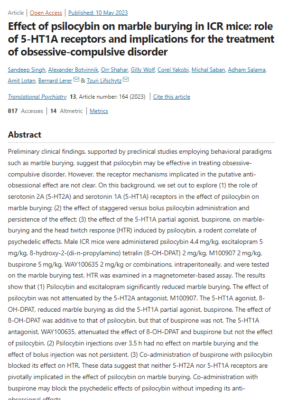
A new study published in Translational Psychiatry explores psilocybin’s potential to curb obsessive behaviors in OCD patients, even without its psychedelic effects. Removing these effects moves treatment away from closely monitored settings and may encourage patients intimidated by hallucinations.
Traditional therapies tend to fail for a significant number, at least a third, of patients who suffer from this condition, so finding a new way to tackle the issue could bring them much-needed relief.
The researchers conducted an experiment using the marble-burying test to examine the impact of psilocybin on obsessive behaviors in mice, with positive results. Subsequently, the mice were administered medication to block serotonin receptors and eliminate the psychedelic effects. Blocking these serotonin receptors did not hinder the reduction of obsessive behavior.
Furthermore, the researchers observed a reduction in obsessive behaviors which lasted a minimum of seven days in mice. These are promising findings for OCD patients, suggesting that this treatment could offer a long-term solution. It’s now crucial to explore how this treatment affects humans and determine whether these benefits translate directly.
Canadian study demonstrates a decrease in substance use after psychedelics
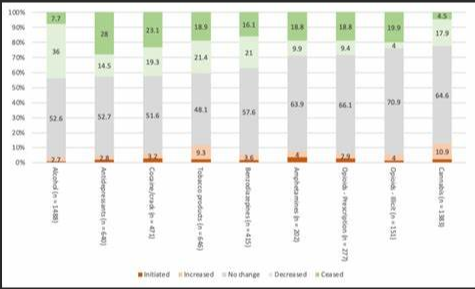
The Multidisciplinary Association of Psychedelic Studies Public Benefits Corp. (MAPS PBC) and Psygen Labs Inc. sponsored a recent study published in the International Journal of Mental Health and Addiction that explores the changes in substance use patterns in Canadians after taking psychedelics.
Researchers from numerous universities gathered data from an online cross-sectional survey that was 655 questions long, with 1639 participants 19 years and older. They self-reported their current and past use of psychedelic substances and their substance use habits.
Nearly 44% of participants reported stopping or sharply decreasing their consumption of alcohol, 42.5% stopped taking antidepressants or reducing the frequency they took them at, and 42.4% stopped or reduced their cocaine consumption.
Participants who were female, younger, and experienced in micro and macro psychedelic doses were the most likely to report decreasing their substance use.
Those who used psychedelics as a tool to treat a medical condition also reported higher reductions in substance use than those with other motivations.
13.5% of participants reported increasing their substance use or having started using a substance after taking psychedelics. While it’s a small number and pales in comparison to those who had a positive outcome, it should be considered for future studies.
Read also: Canadian Study Uncovers Significant Reductions in Substance Use After Psychedelics
